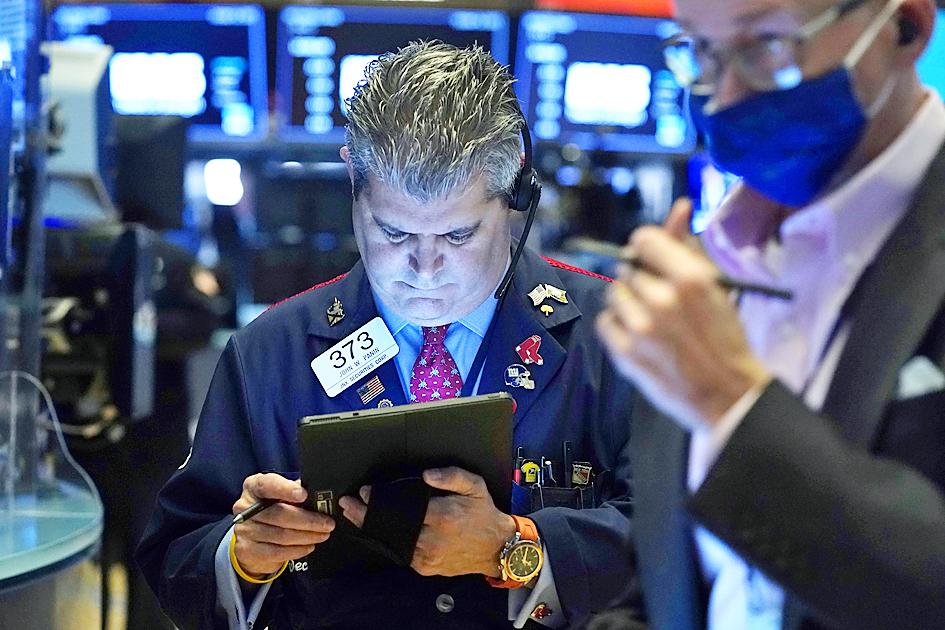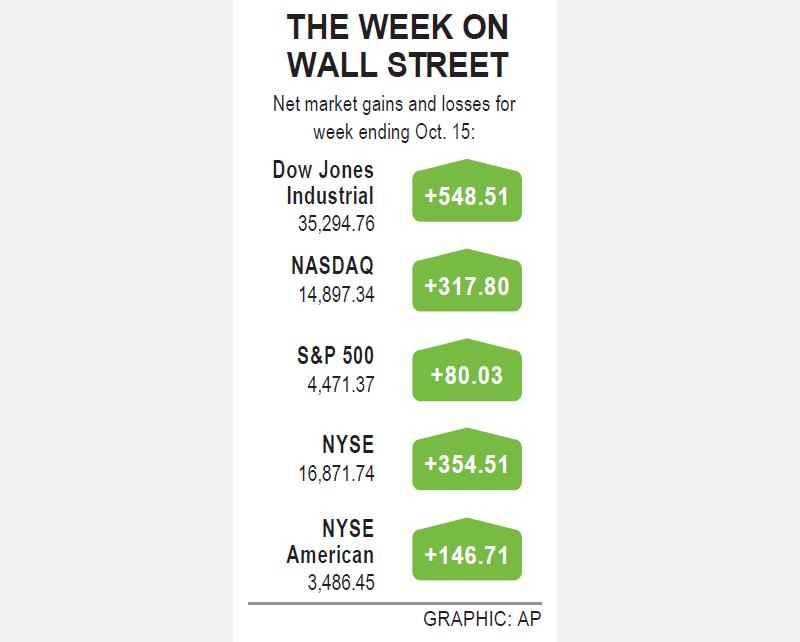US stocks rose on Friday and the Dow Jones Industrial Average scored its biggest weekly percentage gain since June, as Goldman Sachs Group Inc rounded out a week of strong quarterly earnings for the big banks.
Goldman Sachs shares jumped 3.8 percent and gave the Dow its biggest boost, as a record wave of dealmaking activity drove a surge in the bank’s quarterly profit.
Goldman’s report followed strong results from Bank of America and others this week. Banks were among the biggest positives for the S&P 500 on the day, and the index’s bank index climbed 2.1 percent.

Photo: AP
Results from big financial institutions provided a strong start to third-quarter US earnings, although investors would still watch in coming weeks for signs of impacts from supply chain disruptions and higher costs, especially for energy.
Forecasts now call for third-quarter S&P 500 earnings to show a 32 percent rise from a year earlier. The latest forecast, based on results from 41 S&P 500 companies and estimates for the rest, is up from 29.4 percent at the start of this month, according to IBES data from Refinitiv.
“We’re starting to get into an earnings-driven rally here that I hope lasts. We’ll really see the results in the next couple of weeks as a great bulk of companies in all sectors report,” said Peter Tuz, president of Chase Investment Counsel in Charlottesville, Virginia.

Alcoa Corp shares surged 15.2 percent after the aluminum producer reported stronger-than-expected results, announced a US$500 million buyback program and initiated a quarterly cash dividend.
The Dow Jones Industrial Average rose 382.2 points, or 1.09 percent, to 35,294.76, the S&P 500 gained 33.11 points, or 0.75 percent, to 4,471.37 and the NASDAQ Composite added 73.91 points, or 0.5 percent, to 14,897.34.
The Dow jumped 1.6 percent for the week, its biggest weekly percentage gain since June 25. The S&P 500 had its strongest weekly advance since July 23, gaining 1.8 percent.
The NASDAQ added 2.2 percent for the week.
The US Department of Commerce reported a surprise rise in retail sales last month, although investors still worried that supply constraints could disrupt the holiday shopping season. A preliminary reading for consumer sentiment this month came in slightly below expectations.
Moderna Inc shares fell 2.3 percent. A Wall Street Journal report, citing people familiar with the matter, said the US Food and Drug Administration (FDA) is delaying its decision on authorizing Moderna’s COVID-19 vaccine for adolescents to check if the shot could increase the risk of heart inflammation.
On Thursday, Moderna shares jumped when an FDA panel voted to recommend booster shots of its COVID-19 vaccine for Americans aged 65 or older and high-risk people.
Shares of cryptocurrency and blockchain-related firms gained as bitcoin hit US$60,000 for the first time since April. Riot Blockchain Inc ended up 6.6 percent.
Advancing issues outnumbered declining ones on the New York Stock Exchange by a 1.12-to-1 ratio; on NASDAQ, a 1.24-to-1 ratio favored decliners.
The S&P 500 posted 57 new 52-week highs and no new lows; the NASDAQ Composite recorded 124 new highs and 59 new lows.

MULTIFACETED: A task force has analyzed possible scenarios and created responses to assist domestic industries in dealing with US tariffs, the economics minister said The Executive Yuan is tomorrow to announce countermeasures to US President Donald Trump’s planned reciprocal tariffs, although the details of the plan would not be made public until Monday next week, Minister of Economic Affairs J.W. Kuo (郭智輝) said yesterday. The Cabinet established an economic and trade task force in November last year to deal with US trade and tariff related issues, Kuo told reporters outside the legislature in Taipei. The task force has been analyzing and evaluating all kinds of scenarios to identify suitable responses and determine how best to assist domestic industries in managing the effects of Trump’s tariffs, he

TIGHT-LIPPED: UMC said it had no merger plans at the moment, after Nikkei Asia reported that the firm and GlobalFoundries were considering restarting merger talks United Microelectronics Corp (UMC, 聯電), the world’s No. 4 contract chipmaker, yesterday launched a new US$5 billion 12-inch chip factory in Singapore as part of its latest effort to diversify its manufacturing footprint amid growing geopolitical risks. The new factory, adjacent to UMC’s existing Singapore fab in the Pasir Res Wafer Fab Park, is scheduled to enter volume production next year, utilizing mature 22-nanometer and 28-nanometer process technologies, UMC said in a statement. The company plans to invest US$5 billion during the first phase of the new fab, which would have an installed capacity of 30,000 12-inch wafers per month, it said. The

Taiwan’s official purchasing managers’ index (PMI) last month rose 0.2 percentage points to 54.2, in a second consecutive month of expansion, thanks to front-loading demand intended to avoid potential US tariff hikes, the Chung-Hua Institution for Economic Research (CIER, 中華經濟研究院) said yesterday. While short-term demand appeared robust, uncertainties rose due to US President Donald Trump’s unpredictable trade policy, CIER president Lien Hsien-ming (連賢明) told a news conference in Taipei. Taiwan’s economy this year would be characterized by high-level fluctuations and the volatility would be wilder than most expect, Lien said Demand for electronics, particularly semiconductors, continues to benefit from US technology giants’ effort

‘SWASTICAR’: Tesla CEO Elon Musk’s close association with Donald Trump has prompted opponents to brand him a ‘Nazi’ and resulted in a dramatic drop in sales Demonstrators descended on Tesla Inc dealerships across the US, and in Europe and Canada on Saturday to protest company chief Elon Musk, who has amassed extraordinary power as a top adviser to US President Donald Trump. Waving signs with messages such as “Musk is stealing our money” and “Reclaim our country,” the protests largely took place peacefully following fiery episodes of vandalism on Tesla vehicles, dealerships and other facilities in recent weeks that US officials have denounced as terrorism. Hundreds rallied on Saturday outside the Tesla dealership in Manhattan. Some blasted Musk, the world’s richest man, while others demanded the shuttering of his